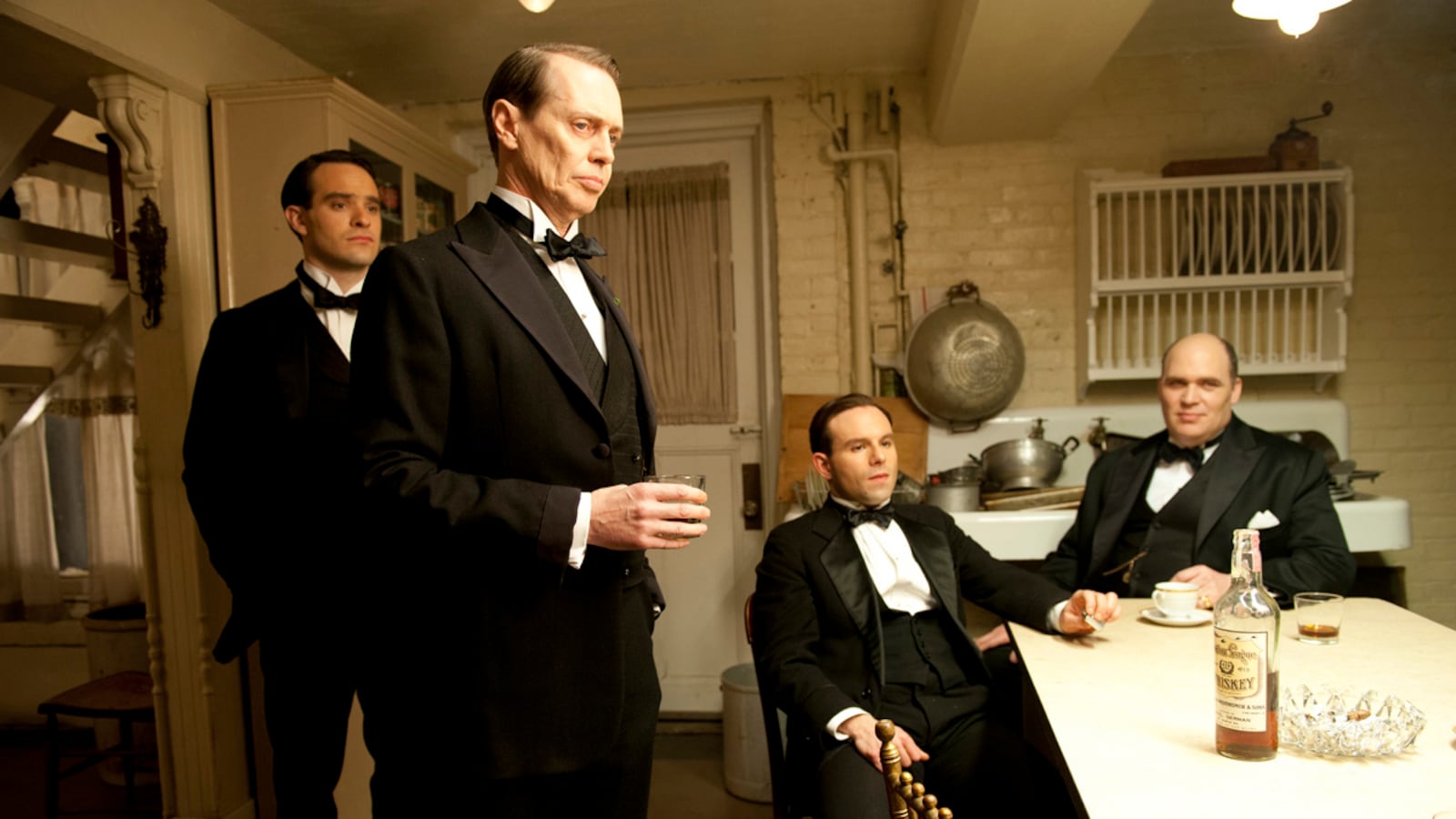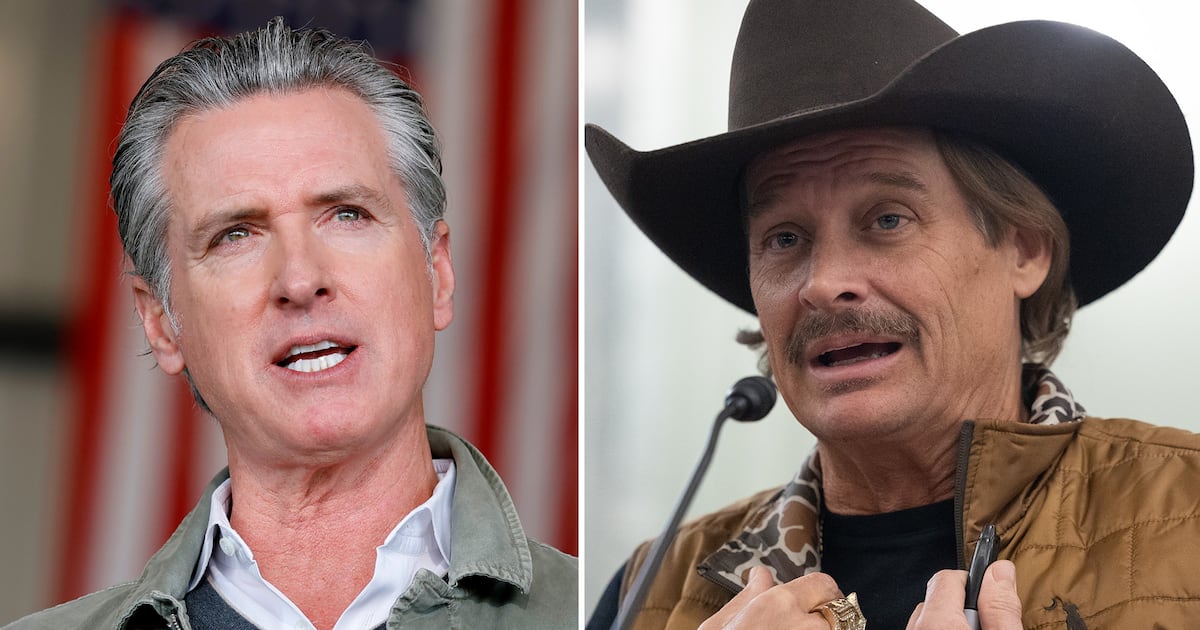Instead of the traditional acceptance speech, Steve Buscemi was apologizing. “I know, I’m sorry,” Buscemi told the audience as he accepted his SAG award for best actor last January, “please stop yelling at me on the street.”
Rarely in television have people connected with so much success had to do so much apologizing.
On the final episode of Boardwalk Empire’s second season, Buscemi’s Nucky Thompson—Atlantic City’s political boss, bootlegger, and part-time gangster—killed off Michael Pitt’s Jimmy Darmody, Nucky’s one-time protégé, in one of the most jolting season-ending episodes in recent memory. The immediate reaction from the show’s fandom was outrage. Disbelief over Jimmy’s murder lit up the Internet and drove tweeters crazy; many swore they would never watch the show again. After Sunday night’s season premiere, I’d be surprised if those who were angry have been mollified.
Exactly why the show’s writers took such a chance still isn’t clear. Executive producer Terence Winter admitted last December to Entertainment Weekly that he made the decision to kill off Jimmy. Here’s his rationale: “The idea was to try and push things to their absolute limit, even if it makes it difficult for yourself and your writing team. If you take things to their logical extreme with the situation we created, Jimmy betrayed Nucky, he tried to have him killed. You want to be honest about the storytelling.”
I presume by “honest about the storytelling,” Winter didn’t mean fidelity to the historical record. Long ago the series jumped wildly off that track—the show is loosely inspired by the real life Atlantic City ward boss, Nucky Johnson, who made his town into an unofficial convention mecca for organized crime figures from all over the country. I imagine he meant honest in the sense that the characters would behave logically within the situations the writers put them in.
“In the pilot, Jimmy told Nucky, ‘You can’t be half a gangster anymore,’” Winter told EW. “We wanted with the first two seasons to follow that trajectory, where he goes full season from being the guy who doesn’t want to get his hands dirty to actually pulling the trigger himself. And what’s the strongest version of that? To pull the trigger on the very guy who told him, ‘You can’t be half a gangster anymore.’ Anything short of Nucky doing it himself, it wouldn’t be real. And it would be a cheat for us to say, ‘We want to keep our beloved character Jimmy Darmody alive.’”

This assertion is false in so many ways it’s difficult to know where to start. I’ll begin with Winter’s last line: “We want to keep our beloved character Jimmy Darmody alive.” I wasn’t previously a fan of Michael Pitt, but in this role he brought something to the table that many of the other gangster characters did not: a Cagney-like volatility that kept you guessing as to what Jimmy would do and to whom he would do it. He wasn’t beloved, he was terrifying.
Second, graduating from half a gangster to a whole one would mean not pulling the trigger yourself—you’ll note that Nucky’s opposite in New York, the enigmatic gambler, bootlegger and organized crime financier Arnold Rothstein (beautifully brought to life by Michael Stuhlberg) never lifts a finger, but doles out the dirty work to his underlings, Lucky Luciano and Meyer Lansky (two more superb historical recreations by Vincent Piazza and Anatol Yusef). What Winter feels is real about Nucky’s character doing his own killing is precisely what comes off as false. Nucky’s brother, Eli (Shea Whigham), the former police chief, was part of the assassination plot, but somehow Nucky seems to lack the nerve to rectify that wrong the way Michael Corleone did with Fredo in The Godfather, Part II.
And anyway, what was the point in drawing Nucky out as a gangster if the story line in the third season involves pulling Nucky out of bootlegging, thus making him “half a gangster” again? (“I’m out of the rackets,” he will proclaim in Episode 5, “I’m a philanthropist now.”)
In its third season, Boardwalk Empire looks as gorgeous as ever with its high-ceilinged, wood-paneled, gas-lit interiors and lavish Gilded Age and Art Deco exteriors. The music (last year’s soundtrack won an Emmy), featuring Eddie Cantor, Caruso, and Bessie Smith, juxtaposed with contemporary artists like Regina Spektor, is an audio feast.
But through the five episodes HBO sent out, there is a gaping hole in the story, and it isn’t even filled by the massive frame of the talented Bobby Cannavale. His Sicilian hood, Gyp Rosetti, who kills over slights he alone perceives, is the scariest character Boardwalk Empire has yet produced—even more unnerving than Steven Graham’s Al Capone, which is saying something. But Gyp has no past history or personal connection to anyone in the story; he seems to have a mountain-size chip on his shoulder, and we don’t know why. And he doesn’t draw you in the way Pitt’s Jimmy did.
Winter also told EW after the Season 2 finale, “Now we’re back in the writers' room trying to figure out where we go from here without Jimmy Darmody.” The answer so far is: nowhere. One wonders why the show’s writers didn’t understand the kind of tension that would have resulted by keeping Jimmy in the same story line with Nucky.
Pitt’s absence isn’t doing Steve Buscemi any good, either. Buscemi was terrific in the first two seasons, both sly and menacing as Nucky tried to pull off a balancing act between political gang boss and outstanding citizen/husband. Now, with Jimmy gone and alienated from both his brother and his wife, Margaret (Kelly Macdonald), Buscemi seems isolated and forlorn, haunted by a past he must constantly drag behind him. (Living through the dark night of the soul isn’t Buscemi’s strong suit as an actor.)
I don’t blame Buscemi, I blame Winter. Boardwalk Empire still crackles in some scenes, but increasingly they are scenes that don’t involve Nucky. Rothstein, Luciano, and Lansky seem to be having a lot more fun.






